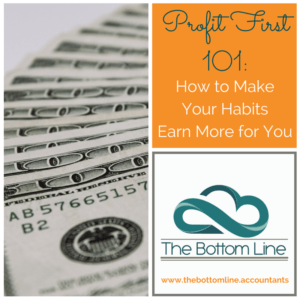As business owners, many of us are constantly reminded that, “you need an accounting system and you need to know how to read your reports and understand your numbers.”
What if there was an accounting system that was incredibly easy and worked with our natural instinct of bank balance accounting?

What is Bank Balance Accounting?
If you need to know how much money to have to spend, what do you do?
If you're like most people, you'll log into your bank's website, mentally add up and subtract what you think will be going in the next 2 weeks to 30 days, and then you'll see how much money you have left and make an instant decision on what to do next.
For your average consumer, that might work out fine, but as business owners, we have many other aspects to think of: payroll, profit, expenses, taxes … etc.
Small Plates vs. The Big Plate
Profit First author Mike Michalowicz uses this natural “bank balance accounting” habit to your advantage by helping you creating “small plates” to work from.
Instead of having one “big plate” (aka bank account) to keep track of all your finances, Mike recommends having five “small plates”:
- Income (for all your incoming funds)
- Profit
- Owner's Pay
- Taxes
- Operating Expenses
Anytime you have money come into your business, it will land in the income account. From there, you can transfer the money into the other 4 accounts:
- 5% to Profit
- 50% to Owner's Pay
- 15% to Taxes
- 30% to Operating Expenses
Now, when you want to hire a new team member or purchase something for your business, simply login to your bank's website, and check your Operating Expenses account. Only the money in that account is for those regular business expenses.
If it's time to pay your apartment rent or home mortgage, login to your bank's website and check your Owner's Pay account – that's the money you use for personal bills, groceries, investments … etc.
I can’t tell you how freeing it is when income arrives and I go ahead and push money to the owner’s pay account and it's not in that big account anymore – it's sitting over there for me to use when I'm ready to use it.
There's no accidental, “I spent that money” or, “OK I gotta sell something to make up for that money we just spent on something else.”
When you send money to Profit or even Taxes, though it seems small to the whole as a start, it is empowering to know that you made that decision, you were being disciplined and you were telling your money what it was going to do instead of your money running you around.
